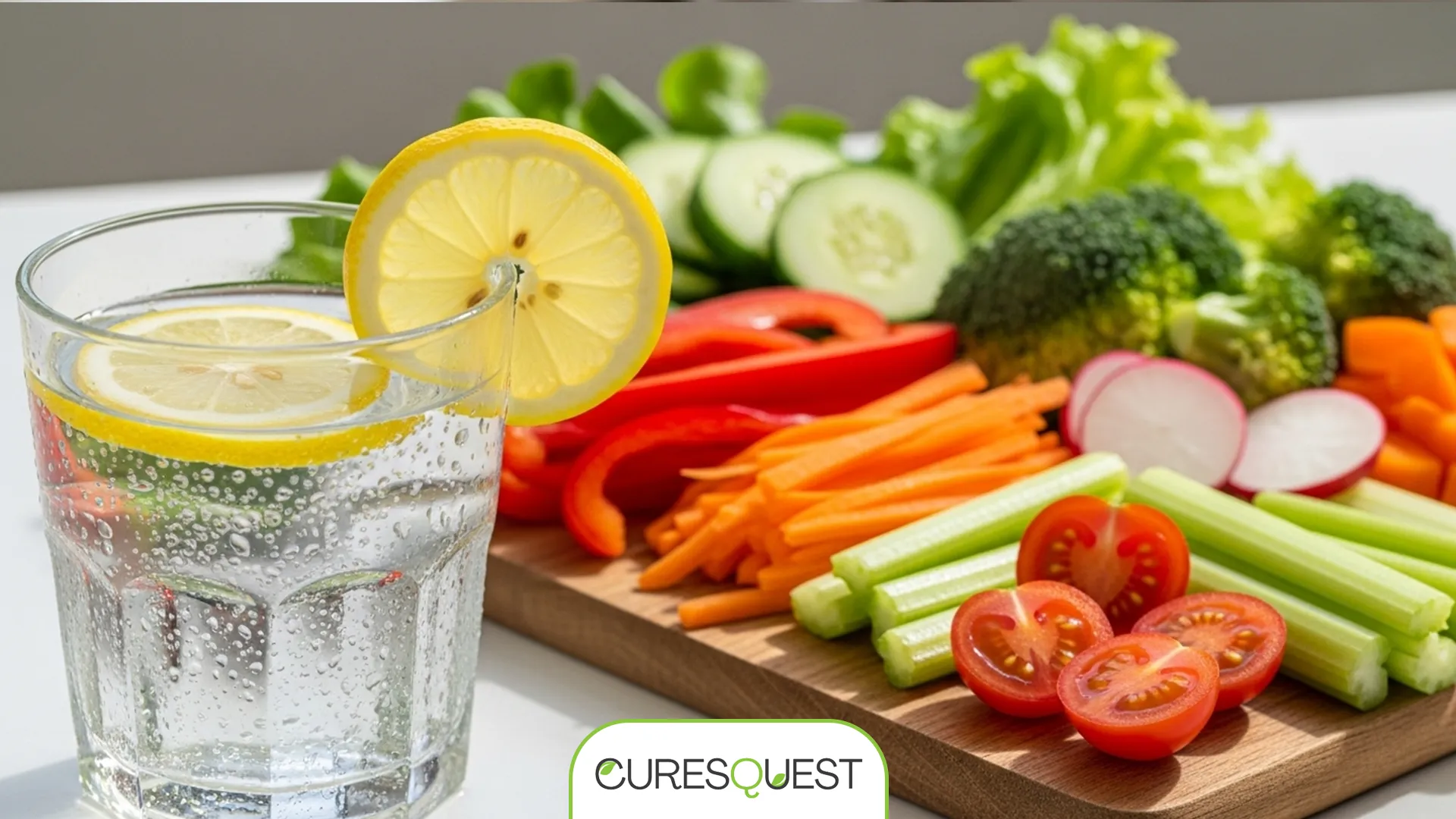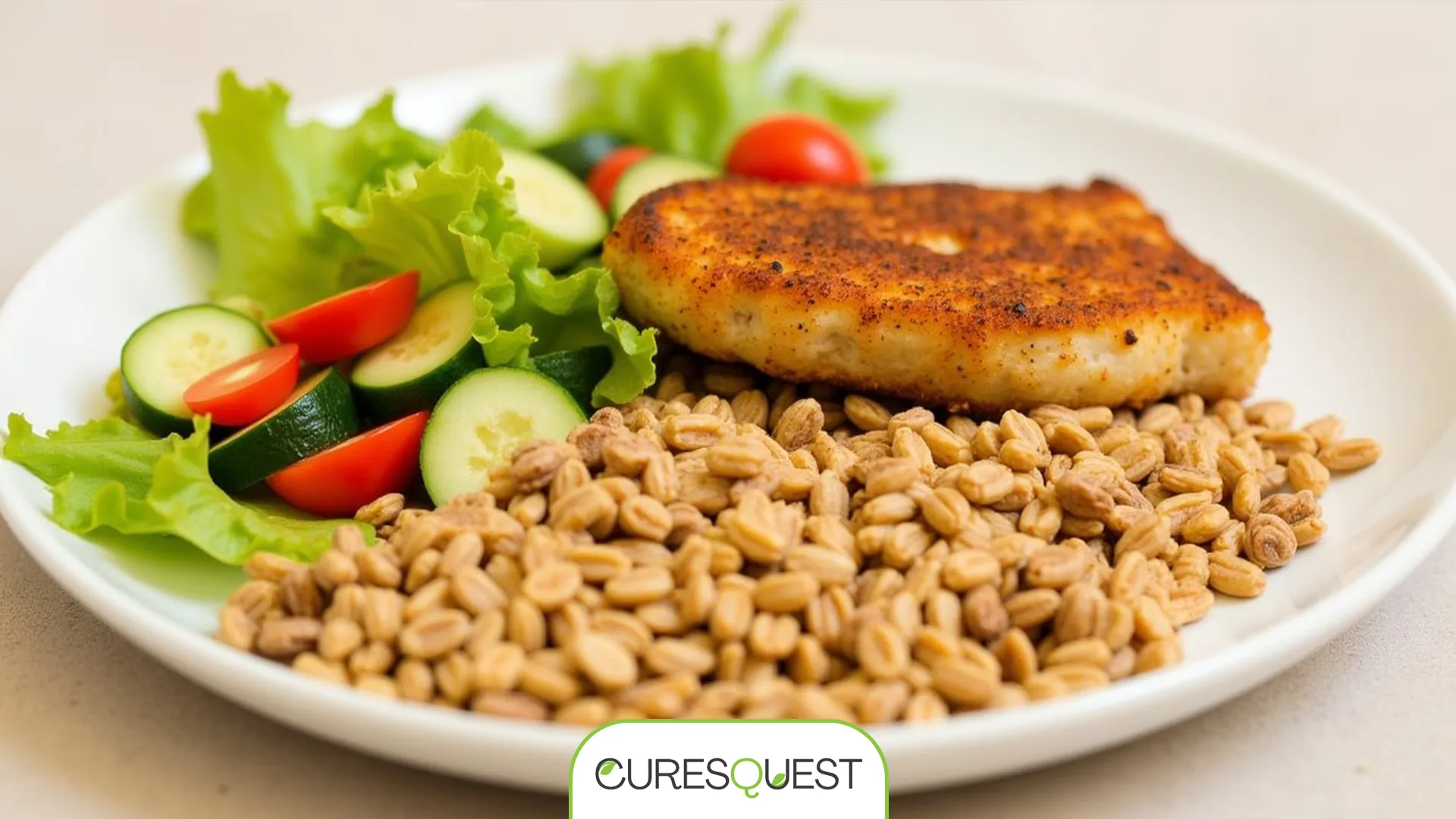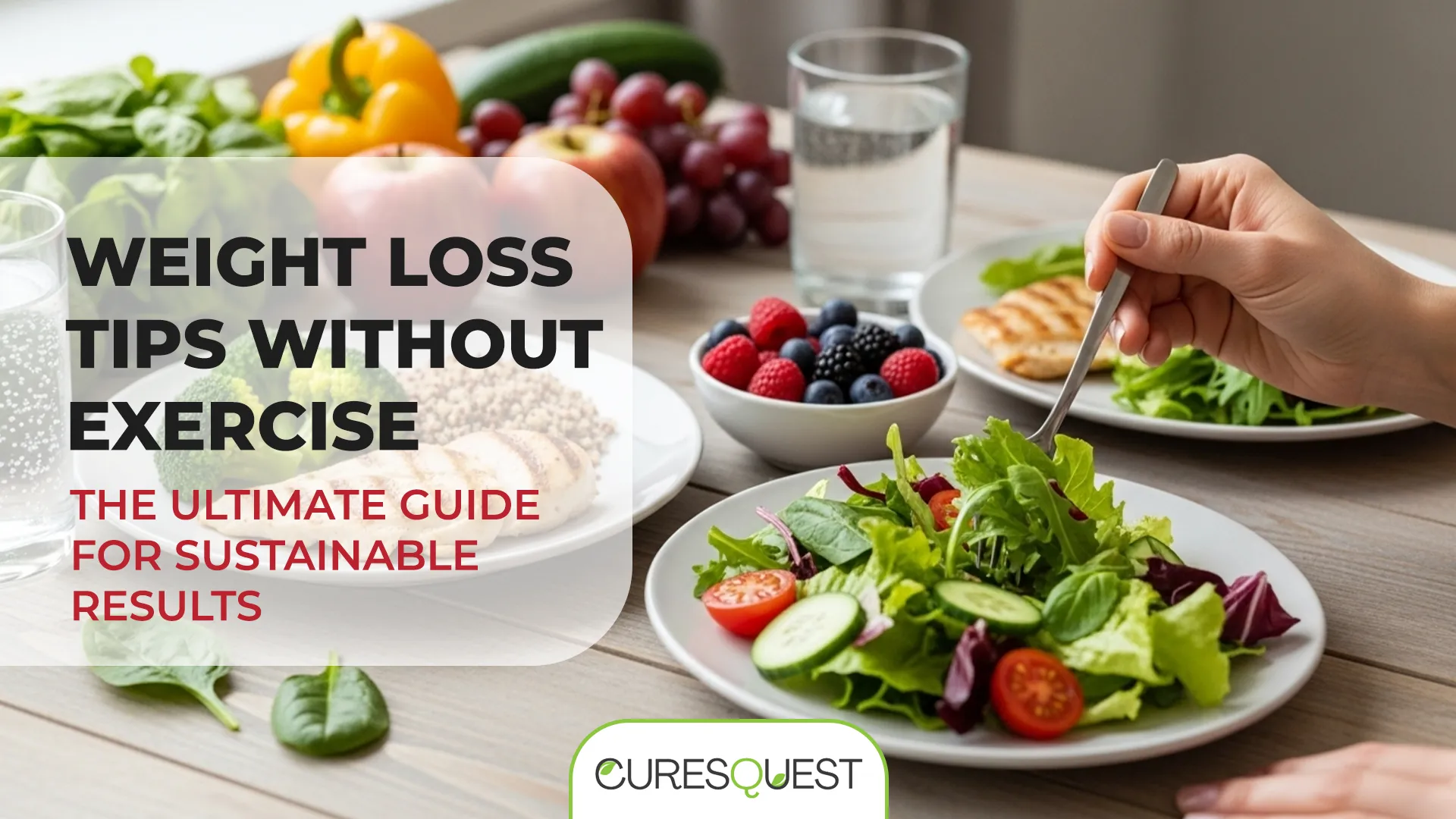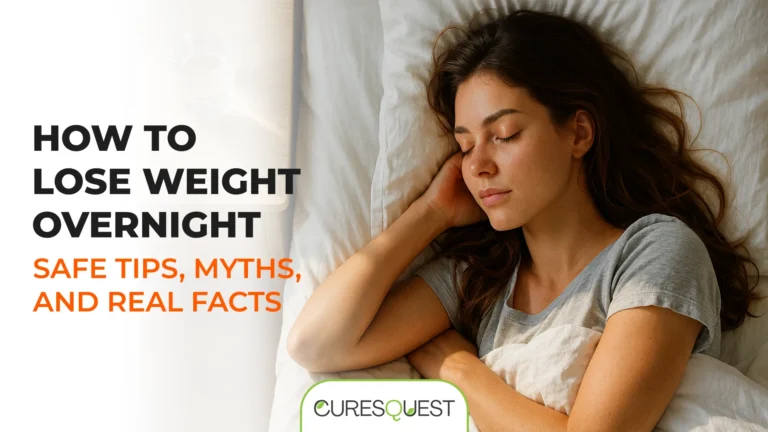Losing excess weight often conjures images of sweaty gym sessions or intense workout plans. Yet, for many, the thought alone becomes a barrier. Whether due to time constraints, physical limitations, or personal preferences, millions seek effective weight loss tips without exercise. The good news? Science confirms that sustainable weight loss is possible even without hitting the gym. The secret is a combination of mindful nutrition, simple lifestyle tweaks, and a focus on behavioral change.
In this comprehensive guide, you’ll learn the latest evidence-based strategies for weight loss tips without exercise. We’ll break down practical, research-backed methods from dietary adjustments to psychology and daily habits—to help you achieve results and keep the pounds off for good.
Table of Contents
Why Focus on Weight Loss Tips Without Exercise?
Many health resources emphasize the vital role of physical activity in weight management. Exercise offers immense benefits for heart, brain, and overall wellness. Yet, when it comes to pure fat loss, your daily calorie intake the food and drink you consume remains the decisive factor. For those who can’t or prefer not to exercise, losing weight is still achievable by manipulating diet, routines, and mindset.
Studies support these key points:
- Achieving a calorie deficit (burning more calories than you consume) is the principle behind weight loss—regardless of exercise.
- Strategic behavioral and dietary changes can create this deficit without workouts.
- Lifestyle factors—hydration, stress, sleep, eating habits—profoundly influence metabolism and weight.
Contrary to diet fads or quick-fix pills, this approach targets lasting changes that fit real lives.
To explore behavioral strategies in depth, Verywell Health’s CBT for weight loss provides a helpful overview.
What Are the Best Weight Loss Tips Without Exercise?
1. Prioritize Portion Control
Why It Works: Most people underestimate how much they eat. Portion sizes have crept up in restaurants and at home, leading to “portion distortion” and unintentional overeating.
Key Strategies:
- Use smaller plates and bowls for meals.
- Measure or visually gauge standard portions, especially for calorie-dense foods (fats, grains).
- Pre-portion snacks into small containers, avoiding eating from large bags or packages.
Smaller dishware tricks your brain into feeling satisfied with less, while mindful serving sizes help you curb total intake without feeling deprived.
2. Practice Mindful Eating
Many weight loss tips without exercise revolve around how you eat, not just what you eat.
Tips for Mindful Eating:
- Chew slowly and allow at least 20 minutes per meal for fullness signals to reach your brain.
- Eat without TV, smartphones, or other distractions.
- Identify true hunger versus emotional triggers (boredom, stress, habit).
- Savor each bite and notice flavors, textures, and satisfaction.
Mindful eating helps prevent unintentional overeating, improves digestion, and fosters a healthier relationship with food.
3. Increase Hydration
Water is a reliable, science-backed weight management tool. It’s calorie-free, fills your stomach, and may slightly boost your resting metabolic rate.
Hydration Tips:
- Drink a large glass of water before meals to decrease appetite naturally.
- Replace sugary beverages with water or herbal teas.
- Keep a water bottle nearby as a visual reminder.
For a science-based look at hydration and metabolism, explore How much water should you drink for weight loss.Several studies show that adequate hydration can suppress appetite, enhance metabolism, and support fat loss—making it one of the easiest weight loss tips without exercise.

4. Fill Up on Protein and Fiber
Why It Works: High-protein and high-fiber foods deliver lasting satiety, stabilize blood sugar, and reduce cravings for empty calories.
Top Protein Sources: Eggs, Greek yogurt, lentils, beans, chicken breast, tofu, seafood.
Top Fiber Sources: Vegetables, fruits, whole grains, legumes, seeds, nuts.
Aim for protein with every meal and snack, and add plenty of fiber-rich vegetables and fruits to meals for fullness and digestive health.
5. Prepare More Meals at Home
Research Insight: Dining out or ordering takeout often leads to oversized portions, hidden sugars, and high-calorie sauces. Cooking at home puts you in control of ingredients and serving sizes.
Actionable Tips:
- Plan and prep simple meals in advance (homemade salads, stir-fries, soups, grain bowls).
- Use healthy cooking methods: roasting, baking, sautéing with minimal oil, air-frying.
- Keep healthy snacks, like cut veggies or portioned nuts, ready for busy days.
Cooking at home fosters mindful choices, aids portion control, and helps streamline calorie intake without effort. If you want to dive deeper into portion control techniques, visit Healthline’s guide on portion control.

6. Embrace Smart Food Swaps
Switching high-calorie staples for lighter options can have a dramatic impact over time:
- Swap regular soda or juice for water, seltzer, or unsweetened iced tea.
- Choose whole fruit over fruit juice or dried fruit.
- Integrate zoodles (zucchini noodles) or cauliflower rice for carb-heavy sides.
- Opt for lean proteins (turkey, beans, fish) over processed meats.
These simple tweaks reduce overall calories while still satisfying tastes and preferences.
7. Leverage NEAT: Non-Exercise Activity Thermogenesis
You may be surprised, but NEAT—calories burned through daily movement that’s not formal exercise—plays a huge role in weight maintenance.
Ways to Boost NEAT:
- Stand or pace when on phone calls.
- Do household chores like vacuuming, laundry, or gardening.
- Take stairs instead of elevators.
- Park farther from entrances; walk or bike short distances.
- Fidget, stretch, or get up from your desk for a minute each hour.
Accumulating small bouts of movement throughout the day can add up to significant calorie burn and support weight loss tips without exercise.
8. Improve Sleep Quality
Chronic sleep deprivation disrupts hormones regulating appetite (ghrelin, leptin), making you hungrier and prone to high-calorie cravings.
Simple Sleep Tips:
- Aim for 7-9 hours nightly.
- Wind down with a regular pre-bed routine (reading, meditation, warm shower).
- Limit screens and caffeine an hour before sleep.
- Keep your bedroom dark, cool, and quiet.
Better sleep helps regulate hunger, cravings, energy, and even willpower for consistent healthy choices.
9. Manage Stress Effectively
Stress drives many people to “stress eat,” skip meals, or reach for comfort foods, often derailing weight loss efforts.
Effective Stress-Reduction Tactics:
- Practice deep breathing, mindfulness, or meditation.
- Maintain a journal to track triggers or eating patterns.
- Build a support network of friends or a health coach.
- Seek out enjoyable hobbies or activities to relax.
Mastering stress can prevent weight gain and emotional eating, reinforcing your weight loss tips without exercise.
10. Use Cognitive-Behavioral Techniques
Changing your mindset is essential for sustainable results. Techniques from Cognitive Behavioral Therapy (CBT) help you recognize and reframe unhelpful thoughts and habits.
CBT-Based Tips:
- Identify “sabotaging” thoughts (e.g., “I deserve a treat because I’m stressed”).
- Replace automatic negative thoughts with empowering ones (“Skipping dessert helps me reach my goal”).
- Set SMART goals and reward milestones.
- Practice self-compassion—progress beats perfection.
Applying tactics from weight-loss psychology strengthens motivation and helps prevent self-sabotage, especially when progress slows.
Additional Science-Backed Nutrition Tips for Weight Loss Without Exercise
Foods with Proven Benefits
Some foods are naturally more helpful for weight loss:
- Eggs: High in choline and protein, keep you full for longer.
- Tomatoes: Packed with antioxidants, support fat metabolism.
- Quinoa & Whole Grains: Provide fiber and protein, aiding fullness.
- Sweet Potatoes: “Slow carbs” that digest gradually, curb hunger.
- Leafy Greens & Fibrous Veggies: Low in calories, high in satiety, gut health boosters.
- Lean Proteins: Chicken breast, fish, tofu, lentils, beans.
- Greek Yogurt: High in protein, calcium, and probiotics.
Replacing calorie-dense snacks or meals with these foods can add up to significant calorie savings while improving nutrition. If you’re just getting started on your weight loss journey and want a clear, beginner-friendly guide, check out our article Weight Loss Tips for Beginners.
Summary Table: Core Weight Loss Tips Without Exercise
| Tip | Description | Example Action |
|---|---|---|
| Portion control | Reduce serving sizes to avoid mindless overeating | Use smaller dishes, pre-portion snacks |
| Mindful eating | Focus on each bite, avoid distractions | No TV/phones at meals, eat slowly |
| Hydration | Drink water to reduce calorie intake and increase fullness | Glass of water before meals |
| High protein & fiber diet | Boost satiety, stabilize blood sugar | Eggs, beans, veggies at every meal |
| Home cooking | Greater control over ingredients and calories | Meal prep, new healthy recipes |
| Smart food swaps | Replace high-calorie foods with lower-calorie variants | Seltzer for soda, cauliflower rice for rice |
| Boost daily NEAT | More daily movement outside of formal workouts | Walking, chores, standing desk |
| Prioritize sleep | Optimize hormones regulating appetite and metabolism | Set bedtime, sleep-friendly routine |
| Stress management | Prevent emotional eating and hormonal imbalance | Meditation, journaling, support groups |
| Cognitive-behavioral techniques | Build lasting habits and positive self-talk | Challenge “sabotaging” thoughts with CBT |
Each strategy targets a unique aspect of weight management, contributing incremental benefits that compound over time. Implementing even a few can lead to significant, sustainable weight loss without exercise.
FAQ
Can you really lose weight effectively without exercise?
Yes. Weight loss tips without exercise can be just as effective when they focus on reducing calorie intake, mindful eating, portion control, and healthy habits. Exercise delivers extra benefits, but diet is the main driver of fat loss.
Which foods help most with weight loss tips without exercise?
Protein-rich foods (like eggs, fish, tofu), high-fiber vegetables, fruits, and whole grains support fullness and metabolism. Avoiding added sugars, processed snacks, and large portions is equally important.
How does stress affect weight loss without exercise?
Chronic stress can disrupt hormones, increase cravings, and trigger emotional eating. Stress management through meditation, journaling, or support groups is a crucial weight loss tip without exercise.
What is NEAT and does it help weight loss without exercise?
NEAT (Non-Exercise Activity Thermogenesis) refers to calories burned from daily non-exercise movements like walking, standing, and household chores. Increasing NEAT is a powerful, underrated way to support fat loss without workouts.
Are there psychological tricks to make losing weight without exercise easier?
Yes. Techniques like Cognitive Behavioral Therapy (CBT) help identify and break negative thought patterns, establish healthier eating habits, and maintain motivation for sustained weight loss without exercise.
Conclusion
Weight loss tips without exercise are both practical and powerful. Modern science and expert consensus underline the importance of a holistic approach—focusing on nutrition, mindset, and lifestyle rather than willpower or extreme regimens. Each strategy outlined above is supported by robust evidence and can be woven into your daily routine with minimal hassle. While results may take time, consistent, small changes deliver lasting, meaningful benefits. Ready to start your journey? Bookmark this guide and begin with 2-3 of these weight loss tips without exercise today. Visit our Blog and join thousands of readers embracing a healthy, sustainable lifestyle.







